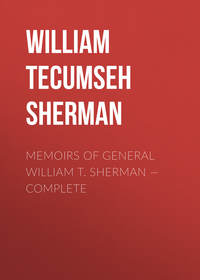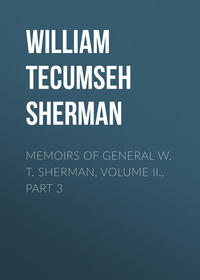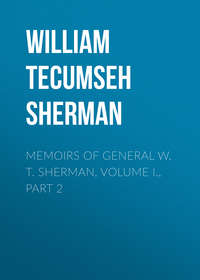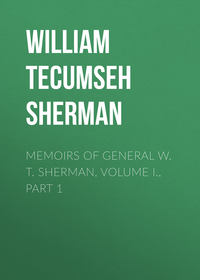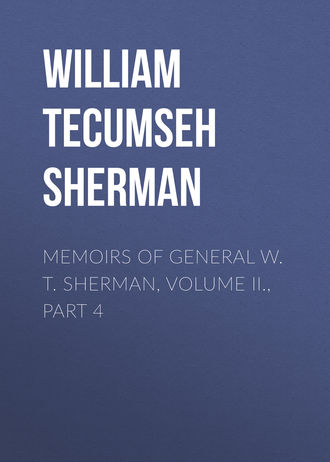 полная версия
полная версияMemoirs of General W. T. Sherman, Volume II., Part 4
W. T. SHERMAN Major-General.
HEADQUARTERS MILITARY DIVISION OF THE MISSISSIPPI
IN THE FIELD, SAVANNAH, GEORGIA, December 24, 1864.
Major-General H. W. HALLECK, Chief-of-Staff; Washington, D. C.
GENERAL: I had the pleasure of receiving your two letters of the 16th and 18th instant to-day, and feel more than usually flattered by the high encomiums you have passed on our recent campaign, which is now complete by the occupation of Savannah.
I am also very glad that General Grant has changed his mind about embarking my troops for James River, leaving me free to make the broad swath you describe through South and North Carolina; and still more gratified at the news from Thomas, in Tennessee, because it fulfills my plans, which contemplated his being able to dispose of Hood, in case he ventured north of the Tennessee River. So, I think, on the whole, I can chuckle over Jeff. Davis's disappointment in not turning my Atlanta campaign into a "Moscow disaster."
I have just finished a long letter to General Grant, and have explained to him that we are engaged in shifting our base from the Ogeeohee to the Savannah River, dismantling all the forts made by the enemy to bear upon the salt-water channels, transferring the heavy ordnance, etc., to Fort Pulaski and Hilton Head, and in remodeling the enemy's interior lines to suit our future plans and purposes. I have also laid down the programme for a campaign which I can make this winter, and which will put me in the spring on the Roanoke, in direct communication with General Grant on James River. In general terms, my plan is to turn over to General Foster the city of Savannah, to sally forth with my army resupplied, cross the Savannah, feign on Charleston and Augusta, but strike between, breaking en route the Charleston & Augusta Railroad, also a large part of that from Branchville and Camden toward North Carolina, and then rapidly to move for some point of the railroad from Charleston to Wilmington, between the Santee and Cape Fear Rivers; then, communicating with the fleet in the neighborhood of Georgetown, I would turn upon Wilmington or Charleston, according to the importance of either. I rather prefer Wilmington, as a live place, over Charleston, which is dead and unimportant when its railroad communications are broken. I take it for granted that the present movement on Wilmington will fail. If I should determine to take Charleston, I would turn across the country (which I have hunted over many a time) from Santee to Mount Pleasant, throwing one wing on the peninsula between the Ashley and Cooper. After accomplishing one or other of these ends, I would make a bee-line for Raleigh or Weldon, when Lee world be forced to come out of Richmond, or acknowledge himself beaten. He would, I think, by the use of the Danville Railroad, throw himself rapidly between me and Grant, leaving Richmond in the hands of the latter. This would not alarm me, for I have an army which I think can maneuver, and I world force him to attack me at a disadvantage, always under the supposition that Grant would be on his heels; and, if the worst come to the worst, I can fight my way down to Albermarle Sound, or Newbern.
I think the time has come now when we should attempt the boldest moves, and my experience is, that they are easier of execution than more timid ones, because the enemy is disconcerted by them–as, for instance, my recent campaign.
I also doubt the wisdom of concentration beyond a certain extent, for the roads of this country limit the amount of men that can be brought to bear in any one battle, and I do not believe that any one general can handle more than sixty thousand men in battle.
I think our campaign of the last month, as well as every step I take from this point northward, is as much a direct attack upon Lee's army as though we were operating within the sound of his artillery.
I am very anxious that Thomas should follow up his success to the very utmost point. My orders to him before I left Kingston were, after beating Hood, to follow him as far as Columbus, Mississippi, or Selma, Alabama, both of which lie in districts of country which are rich in corn and meat.
I attach more importance to these deep incisions into the enemy's country, because this war differs from European wars in this particular: we are not only fighting hostile armies, but a hostile people, and must make old and young, rich and poor, feel the hard hand of war, as well as their organized armies. I know that this recent movement of mine through Georgia has had a wonderful effect in this respect. Thousands who had been deceived by their lying newspapers to believe that we were being whipped all the time now realize the truth, and have no appetite for a repetition of the same experience. To be sure, Jeff. Davis has his people under pretty good discipline, but I think faith in him is much shaken in Georgia, and before we have done with her South Carolina will not be quite so tempestuous.
I will bear in mind your hint as to Charleston, and do not think "salt" will be necessary. When I move, the Fifteenth Corps will be on the right of the right wing, and their position will naturally bring them into Charleston first; and, if you have watched the history of that corps, you will have remarked that they generally do their work pretty well. The truth is, the whole army is burning with an insatiable desire to wreak vengeance upon South Carolina. I almost tremble at her fate, but feel that she deserves all that seems in store for her.
Many and many a person in Georgia asked me why we did not go to South Carolina; and, when I answered that we were enroute for that State, the invariable reply was, "Well, if you will make those people feel the utmost severities of war, we will pardon you for your desolation of Georgia."
I look upon Colombia as quite as bad as Charleston, and I doubt if we shall spare the public buildings there as we did at Milledgeville.
I have been so busy lately that I have not yet made my official report, and I think I had better wait until I get my subordinate reports before attempting it, as I am anxious to explain clearly not only the reasons for every step, but the amount of execution done, and this I cannot do until I get the subordinate reports; for we marched the whole distance in four or more columns, and, of course, I could only be present with one, and generally that one engaged in destroying railroads. This work of destruction was performed better than usual, because I had an engineer-regiment, provided with claws to twist the bars after being heated. Such bars can never be used again, and the only way in which a railroad line can be reconstructed across Georgia is, to make a new road from Fairburn Station (twenty-four miles southwest of Atlanta) to Madison, a distance of one hundred miles; and, before that can be done, I propose to be on the road from Augusta to Charleston, which is a continuation of the same. I felt somewhat disappointed at Hardee's escape, but really am not to blame. I moved as quickly as possible to close up the "Union Causeway," but intervening obstacles were such that, before I could get troops on the road, Hardee had slipped out. Still, I know that the men that were in Savannah will be lost in a measure to Jeff. Davis, for the Georgia troops, under G. W. Smith, declared they would not fight in South Carolina, and they have gone north, en route for Augusta, and I have reason to believe the North Carolina troops have gone to Wilmington; in other words, they are scattered. I have reason to believe that Beauregard was present in Savannah at the time of its evacuation, and think that he and Hardee are now in Charleston, making preparations for what they suppose will be my next step.
Please say to the President that I have received his kind message (through Colonel Markland), and feel thankful for his high favor. If I disappoint him in the future, it shall not be from want of zeal or love to the cause.
From you I expect a full and frank criticism of my plans for the future, which may enable me to correct errors before it is too late. I do not wish to be rash, but want to give my rebel friends no chance to accuse us of want of enterprise or courage.
Assuring you of my high personal respect, I remain, as ever, your friend,
W. T. SHERMAN, Major-General.
[General Order No. 3.]
WAR DEPARTMENT, ADJUTANT GENERAL'S OFFICE
WASHINGTON, January 14, 1865.
The following resolution of the Senate and House of Representatives is published to the army:
[PUBLIC RESOLUTION–No. 4.]
Joint resolution tendering the thanks of the people and of Congress to Major-General William T. Sherman, and the officers and soldiers of his command, for their gallant conduct in their late brilliant movement through Georgia.
Be it resolved by the Senate and House of Representatives of the United States of America in Congress assembled, That the thanks of the people and of the Congress of the United States are due and are hereby tendered to Major-General William T. Sherman, and through him to the officers and men under his command, for their gallantry and good conduct in their late campaign from Chattanooga to Atlanta, and the triumphal march thence through Georgia to Savannah, terminating in the capture and occupation of that city; and that the President cause a copy of this joint resolution to be engrossed and forwarded to Major-General Sherman.
Approved, January 10, 1865.
By order of the Secretary of War,
W. A. NICHOLS, Assistant Adjutant-General.
CHAPTER XXII
SAVANNAH AND POCOTALIGODECEMBER, 1884, AND JANUARY, 1885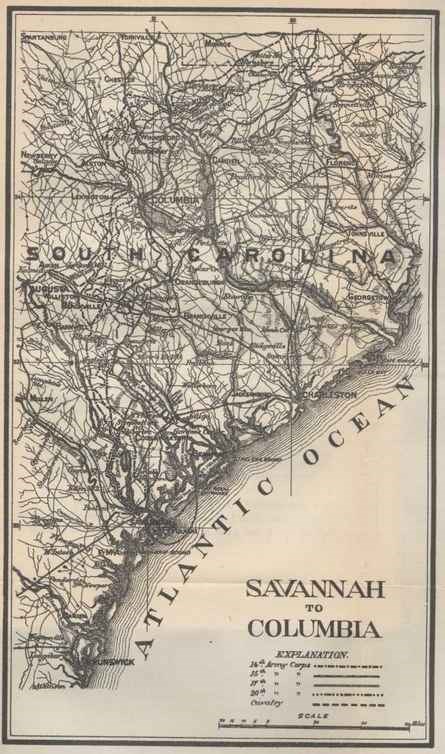
The city of Savannah was an old place, and usually accounted a handsome one. Its houses were of brick or frame, with large yards, ornamented with shrubbery and flowers; its streets perfectly regular, crossing each other at right angles; and at many of the intersections were small inclosures in the nature of parks. These streets and parks were lined with the handsomest shade-trees of which I have knowledge, viz., the Willow-leaf live-oak, evergreens of exquisite beauty; and these certainly entitled Savannah to its reputation as a handsome town more than the houses, which, though comfortable, would hardly make a display on Fifth Avenue or the Boulevard Haussmann of Paris. The city was built on a plateau of sand about forty feet above the level of the sea, abutting against the river, leaving room along its margin for a street of stores and warehouses. The customhouse, court-house, post-office, etc., were on the plateau above. In rear of Savannah was a large park, with a fountain, and between it and the court-house was a handsome monument, erected to the memory of Count Pulaski, who fell in 1779 in the assault made on the city at the time it was held by the English during the Revolutionary War. Outside of Savannah there was very little to interest a stranger, except the cemetery of Bonaventura, and the ride along the Wilmington Channel by way of Thunderbolt, where might be seen some groves of the majestic live-oak trees, covered with gray and funereal moss, which were truly sublime in grandeur, but gloomy after a few days' camping under them:
Within an hour of taking up my quarters in Mr. Green's house, Mr. A. G. Browne, of Salem, Massachusetts, United States Treasury agent for the Department of the South, made his appearance to claim possession, in the name of the Treasury Department, of all captured cotton, rice, buildings, etc. Having use for these articles ourselves, and having fairly earned them, I did not feel inclined to surrender possession, and explained to him that the quartermaster and commissary could manage them more to my liking than he; but I agreed, after the proper inventories had been prepared, if there remained any thing for which we had no special use, I would turn it over to him. It was then known that in the warehouses were stored at least twenty-five thousand bales of cotton, and in the forts one hundred and fifty large, heavy sea-coast guns: although afterward, on a more careful count, there proved to be more than two hundred and fifty sea-coast or siege guns, and thirty-one thousand bales of cotton. At that interview Mr. Browne, who was a shrewd, clever Yankee, told me that a vessel was on the point of starting for Old Point Comfort, and, if she had good weather off Cape Hatteras, would reach Fortress Monroe by Christmas-day, and he suggested that I might make it the occasion of sending a welcome Christmas gift to the President, Mr. Lincoln, who peculiarly enjoyed such pleasantry. I accordingly sat down and wrote on a slip of paper, to be left at the telegraph-office at Fortress Monroe for transmission, the following:
SAVANNAH GEORGIA, December 22, 1884. To His Excellency President Lincoln, Washington, D. C.:
I beg to present you as a Christmas-gift the city of Savannah, with one hundred and fifty heavy guns and plenty of ammunition, also about twenty five thousand bales of cotton.
W. T. SHERMAN, Major-General.
This message actually reached him on Christmas-eve, was extensively published in the newspapers, and made many a household unusually happy on that festive day; and it was in the answer to this dispatch that Mr. Lincoln wrote me the letter of December 28th, already given, beginning with the words, "many, many thanks," etc., which he sent at the hands of General John A. Logan, who happened to be in Washington, and was coming to Savannah, to rejoin his command.
On the 23d of December were made the following general orders for the disposition of the troops in and about Savannah:
[Special Field Order No. 139.]
HEADQUARTERS MILITARY DIVISION OF THE MISSISSIPPI,
IN THE FIELD, NEAR SAVANNAH, GEORGIA, December 23, 1864.
Savannah, being now in our possession, the river partially cleared out, and measures having been taken to remove all obstructions, will at once be made a grand depot for future operations:
1. The chief-quartermaster, General Euston, will, after giving the necessary orders touching the transports in Ogeechee River and Oasabaw Sound, come in person to Savannah, and take possession of all public buildings, vacant storerooms, warehouses, etc., that may be now or hereafter needed for any department of the army. No rents will be paid by the Government of the United States during the war, and all buildings must be distributed according to the accustomed rates of the Quartermaster's Department, as though they were public property.
2. The chief commissary of subsistence, Colonel A. Beckwith, will transfer the grand depot of the army to the city of Savannah, secure possession of the needful buildings and offices, and give the necessary orders, to the end that the army may be supplied abundantly and well.
S. The chief-engineer, Captain Poe, will at once direct which of the enemy's forts are to be retained for our use, and which dismantled and destroyed. The chief ordnance-officer, Captain Baylor, will in like manner take possession of all property pertaining to his department captured from the enemy, and cause the same to be collected and conveyed to points of security; all the heavy coast-guns will be dismounted and carried to Fort Pulaski.
4. The troops, for the present, will be grouped about the city of Savannah, looking to convenience of camps; General Slocum taking from the Savannah River around to the seven-mile post on the Canal, and General Howard thence to the sea; General Kilpatrick will hold King's Bridge until Fort McAllister is dismantled, and the troops withdrawn from the south side of the Ogeechee, when he will take post about Anderson's plantation, on the plank-road, and picket all the roads leading from the north and west.
5. General Howard will keep a small guard at Forts Rosedale, Beaulieu, Wimberley, Thunderbolt, and Bonaventura, and he will cause that shore and Skidaway Island to be examined very closely, with a view to finding many and convenient points for the embarkation of troops and wagons on seagoing vessels.
By order of Major-General W. T. Sherman,
L. M. DAYTON, Aide-de-Camp.
[Special Field Order No. 143.]
HEADQUARTERS MILITARY DIVISION OF THE MISSISSIPPI,
IN THE FIELD, NEAR SAVANNAH, GEORGIA, December 26, 1864.
The city of Savannah and surrounding country will be held as a military post, and adapted to future military uses, but, as it contains a population of some twenty thousand people, who must be provided for, and as other citizens may come, it is proper to lay down certain general principles, that all within its military jurisdiction may understand their relative duties and obligations.
1. During war, the military is superior to civil authority, and, where interests clash, the civil must give way; yet, where there is no conflict, every encouragement should be given to well-disposed and peaceful inhabitants to resume their usual pursuits. Families should be disturbed as little as possible in their residences, and tradesmen allowed the free use of their shops, tools, etc.; churches, schools, and all places of amusement and recreation, should be encouraged, and streets and roads made perfectly safe to persons in their pursuits. Passes should not be exacted within the line of outer pickets, but if any person shall abuse these privileges by communicating with the enemy, or doing any act of hostility to the Government of the United States, he or she will be punished with the utmost rigor of the law. Commerce with the outer world will be resumed to an extent commensurate with the wants of the citizens, governed by the restrictions and rules of the Treasury Department.
2. The chief quartermaster and commissary of the army may give suitable employment to the people, white and black, or transport them to such points as they may choose where employment can be had; and may extend temporary relief in the way of provisions and vacant houses to the worthy and needy, until such time as they can help themselves. They will select first the buildings for the necessary uses of the army; next, a sufficient number of stores, to be turned over to the Treasury agent for trade-stores. All vacant store-houses or dwellings, and all buildings belonging to absent rebels, will be construed and used as belonging to the United States, until such time as their titles can be settled by the courts of the United States.
3. The Mayor and City Council of Savannah will continue to exercise their functions, and will, in concert with the commanding officer of the post and the chief-quartermaster, see that the fire-companies are kept in organization, the streets cleaned and lighted, and keep up a good understanding between the citizens and soldiers. They will ascertain and report to the chief commissary of subsistence, as soon as possible, the names and number of worthy families that need assistance and support. The mayor will forth with give public notice that the time has come when all must choose their course, viz., remain within our lines, and conduct themselves as good citizens, or depart in peace. He will ascertain the names of all who choose to leave Savannah, and report their names and residence to the chief-quartermaster, that measures may be taken to transport them beyond our lines.
4. Not more than two newspapers will be published in Savannah; their editors and proprietors will be held to the strictest accountability, and will be punished severely, in person and property, for any libelous publication, mischievous matter, premature news, exaggerated statements, or any comments whatever upon the acts of the constituted authorities; they will be held accountable for such articles, even though copied from other papers.
By order of Major-General W. T. Sherman,
L. M. DAYTON, Aide-de-Camp.
It was estimated that there were about twenty thousand inhabitants in Savannah, all of whom had participated more or less in the war, and had no special claims to our favor, but I regarded the war as rapidly drawing to a close, and it was becoming a political question as to what was to be done with the people of the South, both white and black, when the war was actually over. I concluded to give them the option to remain or to join their friends in Charleston or Augusta, and so announced in general orders. The mayor, Dr. Arnold, was completely "subjugated," and, after consulting with him, I authorized him to assemble his City Council to take charge generally of the interests of the people; but warned all who remained that they must be strictly subordinate to the military law, and to the interests of the General Government. About two hundred persona, mostly the families of men in the Confederate army, prepared to follow the fortunes of their husbands and fathers, and these were sent in a steamboat under a flag of truce, in charge of my aide Captain Audenried, to Charleston harbor, and there delivered to an officer of the Confederate army. But the great bulk of the inhabitants chose to remain in Savannah, generally behaved with propriety, and good social relations at once arose between them and the army. Shortly after our occupation of Savannah, a lady was announced at my headquarters by the orderly or sentinel at the front-door, who was ushered into the parlor, and proved to be the wife of General G. W. Smith, whom I had known about 1850, when Smith was on duty at West Point. She was a native of New London, Connecticut, and very handsome. She began her interview by presenting me a letter from her husband, who then commanded a division of the Georgia militia in the rebel army, which had just quitted Savannah, which letter began, "DEAR SHERMAN: The fortunes of war, etc-., compel me to leave my wife in Savannah, and I beg for her your courteous protection," etc., etc. I inquired where she lived, and if anybody was troubling her. She said she was boarding with a lady whose husband had, in like manner with her own, gone off with Hardee's army; that a part of the house had been taken for the use of Major-General Ward, of Kentucky; that her landlady was approaching her confinement, and was nervous at the noise which the younger staff-officers made at night; etc. I explained to her that I could give but little personal attention to such matters, and referred her to General Slocum, whose troops occupied the city. I afterward visited her house, and saw, personally, that she had no reason to complain. Shortly afterward Mr. Hardee, a merchant of Savannah, came to me and presented a letter from his brother, the general, to the same effect, alleging that his brother was a civilian, had never taken up arms, and asked of me protection for his family, his cotton, etc. To him I gave the general assurance that no harm was designed to any of the people of Savannah who would remain quiet and peaceable, but that I could give him no guarantee as to his cotton, for over it I had no absolute control; and yet still later I received a note from the wife of General A. P. Stewart (who commanded a corps in Hood's army), asking me to come to see her. This I did, and found her to be a native of Cincinnati, Ohio, wanting protection, and who was naturally anxious about the fate of her husband, known to be with General Hood, in Tennessee, retreating before General Thomas. I remember that I was able to assure her that he had not been killed or captured, up to that date, and think that I advised her, instead of attempting to go in pursuit of her husband, to go to Cincinnati, to her uncle, Judge Storer, there await the issue of events.
Before I had reached Savannah, and during our stay there, the rebel officers and newspapers represented the conduct of the men of our army as simply infamous; that we respected neither age nor sex; that we burned every thing we came across–barns, stables, cotton-gins, and even dwelling-houses; that we ravished the women and killed the men, and perpetrated all manner of outrages on the inhabitants. Therefore it struck me as strange that Generals Hardee and Smith should commit their, families to our custody, and even bespeak our personal care and attention. These officers knew well that these reports were exaggerated in the extreme, and yet tacitly assented to these publications, to arouse the drooping energies of the people of the South.
As the division of Major-General John W. Geary, of the Twentieth Corps, was the first to enter Savannah, that officer was appointed to command the place, or to act as a sort of governor. He very soon established a good police, maintained admirable order, and I doubt if Savannah, either before or since, has had a better government than during our stay. The guard-mountings and parades, as well as the greater reviews, became the daily resorts of the ladies, to hear the music of our excellent bands; schools were opened, and the churches every Sunday were well filled with most devout and respectful congregations; stores were reopened, and markets for provisions, meat, wood, etc., were established, so that each family, regardless of race, color, or opinion, could procure all the necessaries and even luxuries of life, provided they had money. Of course, many families were actually destitute of this, and to these were issued stores from our own stock of supplies. I remember to have given to Dr. Arnold, the mayor, an order for the contents of a large warehouse of rice, which he confided to a committee of gentlemen, who went North (to Boston), and soon returned with one or more cargoes of flour, hams, sugar, coffee, etc., for gratuitous distribution, which relieved the most pressing wants until the revival of trade and business enabled the people to provide for themselves.


